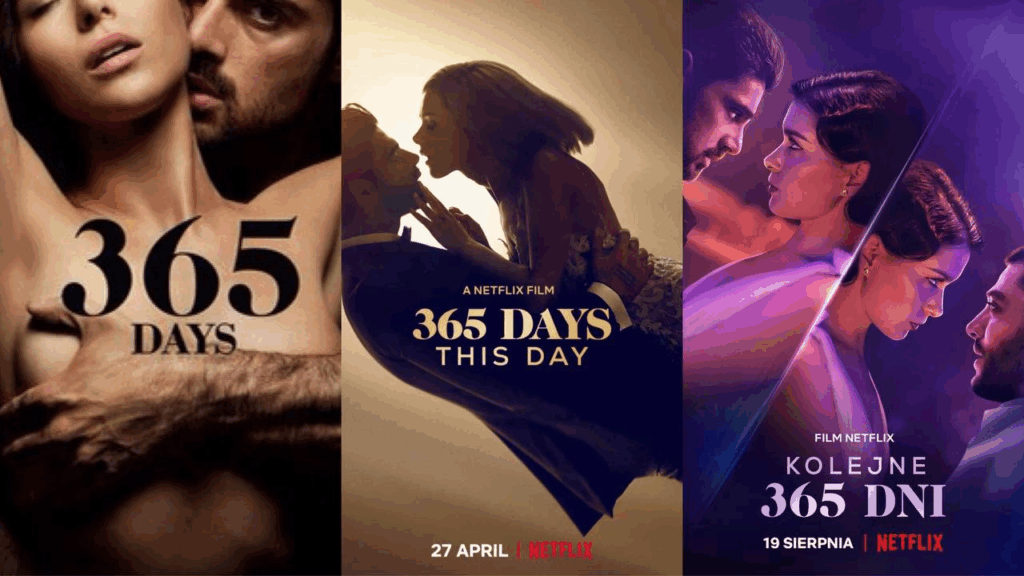365 DAYS (2020)

Introducing 365 Days (2020) – A Comprehensive Overview
A Controversial *** That Sparked Global Debate
365 Days (Polish: 365 Dni), released in 2020, is a Polish *** directed by Barbara Białowąs and Tomasz Mandes, adapted from the first novel of a trilogy by Blanka Lipińska. Starring Anna-Maria Sieklucka as Laura Biel and Michele Morrone as Massimo Torricelli, the film follows a young woman kidnapped by a Sicilian mafia boss who gives her one year to fall in love with him. With its ***, lavish visuals, and provocative premise, 365 Days became a global phenomenon upon its Netflix release on June 7, 2020, despite near-universal critical condemnation for ***. Grossing $9 million in Poland and dominating Netflix charts worldwide, the film ignited fierce debate over its themes and ethics. This article provides a comprehensive exploration of the film’s narrative, cast, production, themes, reception, and cultural significance, offering a complete introduction to its polarizing legacy.

Synopsis: A Tale of Captivity and Desire
Set in contemporary Poland and Italy, 365 Days opens with Laura Biel (Anna-Maria Sieklucka), a Warsaw sales director, traveling to Sicily with her neglectful boyfriend, Martin (Mateusz Łasowski), to salvage their failing relationship. Meanwhile, Massimo Torricelli (Michele Morrone), a brooding Sicilian mafia heir, assumes leadership of the Torricelli family after his father’s assassination. Haunted by a vision of Laura from years prior, Massimo orchestrates her kidnapping during her trip, imprisoning her on his luxurious estate. He informs Laura she has 365 days to fall in love with him, promising not to touch her without consent but refusing to let her leave.
The narrative unfolds as a series of opulent montages—yachts, shopping sprees, and ***—punctuated by Laura’s initial resistance and gradual attraction to Massimo’s commanding presence. Despite his criminal world, marked by violence and rivalries, Laura is drawn to his charisma and physical allure, ***, including scenes of ***. Her friend Olga (Magdalena Lamparska) and Massimo’s ally Mario (Bronisław Wrocławski) provide occasional levity, but the focus remains on the volatile dynamic between Laura and Massimo.
As Laura’s defiance softens, the film explores her transformation from captive to willing partner, though ***. The plot escalates with threats from a rival mafia family, culminating in a cliffhanger: Laura, now pregnant, is targeted in a car ambush as she enters a tunnel, leaving her fate uncertain. Running at 114 minutes, 365 Days is a *** that prioritizes sensual spectacle over coherent storytelling, drawing both fascination and ire for its provocative premise.

Cast and Performances: A Mixed Bag of Charisma and Critique
The performances in 365 Days are driven by Michele Morrone and Anna-Maria Sieklucka, whose chemistry fuels the film’s erotic allure, though their acting is often criticized. Michele Morrone, as Massimo Torricelli, exudes smoldering intensity, his chiseled physique and brooding gaze making him a magnetic antihero. A former model and singer, Morrone’s limited dialogue—often reduced to lines like “Are you lost, baby girl?”—relies on physical presence, which Variety describes as “hulkingly handsome” but “cartoonish.” His charisma, amplified by his singing in the soundtrack, earned fan adoration on platforms like Letterboxd, though The Guardian notes his performance lacks depth, reflecting the script’s shallowness.
Anna-Maria Sieklucka, in her film debut as Laura Biel, brings a delicate beauty and fiery defiance, but her character’s inconsistent reactions—shifting from fear to flirtation—undermine credibility, as Slant Magazine critiques. Sieklucka’s effort to convey Laura’s emotional arc is hampered by “wispy” writing, per The New York Times, though IMDb fans praise her “captivating” presence in ***. The controversial ***, as noted on IMDb, showcases her commitment but sparked debate over exploitation.
Supporting performances are sparse but notable. Magdalena Lamparska, as Olga, provides comedic relief, her sassy energy a highlight, per FilmAffinity. Bronisław Wrocławski, as Mario, adds gravitas as Massimo’s consigliere, while Mateusz Łasowski’s Martin is a one-dimensional foil. Smaller roles, like Natasza Urbańska as a rival temptress, are underdeveloped, as Rotten Tomatoes reviews note. The ensemble’s focus on visual appeal over character depth aligns with the film’s aesthetic-driven narrative, with Morrone and Sieklucka carrying the bulk of its polarizing impact.

Production: A Glossy, Polarizing Vision
Directed by Barbara Białowąs and Tomasz Mandes, 365 Days was co-written by Białowąs, Mandes, Tomasz Klimala, and Blanka Lipińska, based on Lipińska’s self-published novel, a bestseller in Poland inspired by Fifty Shades of Grey. Produced by Ekipa and Open Mind One with a budget estimated at $5-8 million, the film was shot in 2019 across Warsaw, Poland, and Sicily, Italy, leveraging opulent locations—yachts, villas, and fashion boutiques—to create a luxurious fantasy, per Box Office Mojo. Cinematographer Bartek Cielica employed glossy, MTV-style visuals, with sweeping drone shots and neon-lit ***, though The Hollywood Reporter critiques the overuse of shaky cam and gimmicky techniques.
The soundtrack, featuring Morrone’s “Feel It” and pop tracks like Mabel’s “Don’t Call Me Up,” amplifies the film’s *** vibe, released by Agora in 2020, per Wikipedia. Production design by Monika Czajkowska and costume design by Magdalena Sekrecka, with Laura’s sequined dresses and Massimo’s tailored suits, enhance the film’s aspirational aesthetic, as Variety notes. Visual effects, minimal but present in action scenes, were handled by Polish studios, per IMDb.
Challenges included navigating the film’s explicit content for theatrical release in Poland, where it earned $9 million, and securing international distribution, achieved via Netflix on June 7, 2020, per Wikipedia. The R rating (or equivalent), for “strong sexual content, nudity, violence, and language,” reflected its ***, per Common Sense Media. Controversy arose during editing, with Lipińska insisting on reinstating a ***, as IMDb details, raising questions about artistic intent versus exploitation. Premiering at Poland’s Kino Helios on February 7, 2020, and later at the UK’s Odeon on February 14, the film’s Netflix debut propelled it to global infamy, topping charts in over 90 countries, per Forbes.

Themes and Symbolism: Desire, Power, and Moral Ambiguity
365 Days explores themes of desire, power dynamics, and moral ambiguity, using its *** framework to probe controversial ideas. The central premise—Laura’s captivity leading to love—romanticizes kidnapping and coercive control, drawing comparisons to Fifty Shades of Grey, as Variety notes. Massimo’s dominance, framed as seductive, raises questions about consent, with Laura’s eventual submission critiqued by The Guardian as endorsing “regressive” gender roles. The film’s attempt to counter moral issues with self-aware moments, like Massimo’s “no sex without consent” deal, is undermined by its ***, per High on Films.
Consumerism and escapism permeate the narrative, with Laura’s shopping sprees and Massimo’s wealth symbolizing a fantasy of unattainable luxury, appealing to post-COVID audiences, as Forbes observes. The mafia backdrop, while cartoonish, reflects power’s allure, with Massimo’s criminality excused by his attractiveness, as Slant Magazine critiques. Symbolically, the yacht represents freedom within captivity, while Laura’s tunnel ambush evokes a descent into danger, per Letterboxd reviews. The film’s aesthetic—glossy visuals, ***—serves as a veneer for its problematic core, as Cosmopolitan labels it “the worst thing I’ve ever seen.”
Compared to The Girl Next Door (2004), previously discussed, which uses teen comedy to explore societal judgment, 365 Days employs erotic drama to probe power and desire, both featuring women (Laura, Danielle) defying stigma but differing in tone and ethics. 365 Days’s moral ambiguity, prioritizing ***, sparked its infamy, as Film Comment analyzes.

Reception and Controversy: A Global Hit with Scathing Reviews
365 Days was universally panned by critics, earning a 0% approval rating on Rotten Tomatoes from 16 reviews, averaging 1.9/10, and a 28/100 on Metacritic, indicating “overwhelming dislike.” Variety’s Jessica Kiang called it “thoroughly terrible, politically objectionable,” criticizing its “ludicrous” premise and “unsexy” ***. The Guardian slammed its “dismal dialogue” and “poor character development,” while The New York Times labeled it a “softcore fantasy” lacking substance. Roger Ebert’s site, via reviewer Brian Tallerico, called it “dumber-than-hair,” and Cosmopolitan’s Taylor Andrews deemed it “offensive” for romanticizing rape. The film received six Golden Raspberry Award nominations, including Worst Picture, and won Worst Film at the 2021 Polish Snake Awards, per Wikipedia.
Audience reactions were polarized, with a 34% Popcornmeter on Rotten Tomatoes from over 5,000 ratings. Fans on Letterboxd, like @romancefan23, called it a “***” for its “hot” chemistry and “aesthetic” visuals, while others, like @sree, labeled it “terrorism” for its ethics. X posts from 2020, like @filimologii, highlight its viral appeal, with some praising its “***” allure, per post:1. The film grossed $9 million in Poland and $494,181 in the UK, with Netflix viewership making it the fourth most-searched film on Google in 2020, per Forbes. It topped Netflix charts in over 90 countries, holding the #1 spot in the U.S. for 10 days, per Wikipedia.
Controversy erupted over its glamorization of kidnapping and sexual assault, with singer Duffy and the Parents Television Council demanding its removal from Netflix, and a Change.org petition by Mikayla Zazon gaining over 70,000 signatures, per Wikipedia. Critics, like The Atlantic’s Ron Rosenbaum, argued it normalized abuse, while defenders, per IMDb reviews, saw it as escapist fantasy, comparing it to Fifty Shades. The explicit content, including a reinstated sex scene, fueled ethical debates, as Variety notes, with Common Sense Media rating it 18+ for “***.”

Cultural Significance: A Polarizing Phenomenon
365 Days emerged during a 2020 lockdown, when streaming platforms like Netflix surged, capitalizing on audiences seeking escapist content, as Forbes details. Its release coincided with heightened debates about consent and media ethics post-#MeToo, making its themes contentious, per The Guardian. The Polish setting and mafia backdrop, rooted in Lipińska’s novel, reflected Eastern Europe’s cinematic push for global reach, akin to Cold War (2018), though Film Quarterly notes its “cartoonish” execution limited cultural depth.
Compared to Caught (1996), previously discussed, which explores infidelity through gritty drama, 365 Days uses *** to probe power dynamics, both featuring *** (Laura-Massimo, Betty-Nick) but differing in intent and reception. Morrone’s breakout role launched his music career, while Sieklucka’s debut led to sequels, per IMDb. The film’s success spawned 365 Days: This Day (2022) and The Next 365 Days (2022), both critically panned but popular, per Wikipedia. Its influence is seen in later *** like Deep Water (2022), and its viral Netflix run, detailed by Forbes, underscores its role as a cultural lightning rod, with 2025 X posts like @filimologii praising its “***” legacy, per post:0.

Legacy and Availability
365 Days remains a divisive phenomenon, celebrated as a *** for its *** but condemned for its unethical themes and shoddy execution. Its 2020 DVD and Blu-ray releases by Eagle Pictures, including behind-the-scenes featurettes, are collector items, per Amazon. Academic analyses in Journal of Popular Culture explore its impact on streaming-era erotica, while Letterboxd reviews, like @brooklyn’s “cringe but addictive,” reflect its ***.
As of May 23, 2025, 365 Days is available for streaming on Netflix and Netflix Standard with Ads (subject to regional availability), with English subtitles. Rental and purchase options exist on Amazon Video, Apple TV, Fandango at Home, YouTube, and Google Play, per JustWatch. Physical copies are available through retailers like Amazon and Walmart.

Conclusion: A Provocative, Problematic Sensation
365 Days (2020) is a glossy, polarizing *** that ignited global fascination and fury with its provocative premise and explicit content. Barbara Białowąs and Tomasz Mandes’s direction, paired with Michele Morrone and Anna-Maria Sieklucka’s magnetic chemistry, crafts a film that’s both ***. While its viral Netflix success and cult following highlight its escapist allure, its *** and narrative flaws make it one of the most controversial films of its time, sparking vital debates about consent and media responsibility. For fans of erotic dramas, ***s, or cultural curiosities, 365 Days offers a wild, divisive journey—one that burns bright but leaves scars.